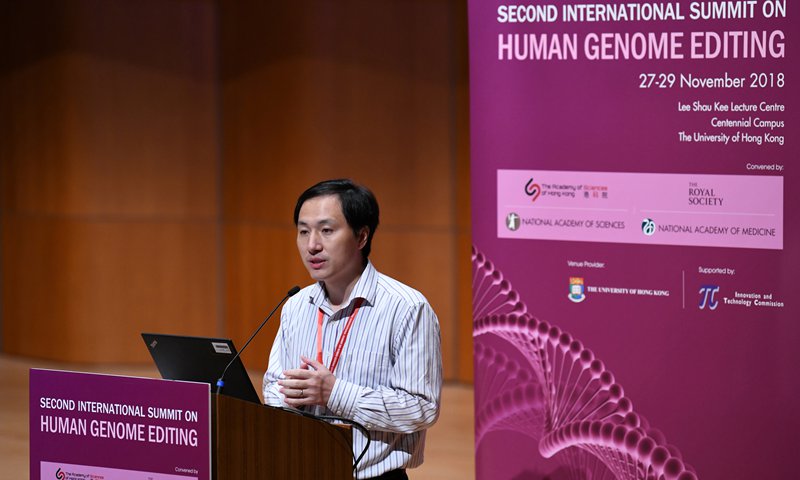China releases ‘landmark’ document on ethics reviews of life sciences, medical research involving humans


Chinese scientist He Jiankui presents his gene-editing experiment at the Second International Summit on Human Genome Editing in Hong Kong on Wednesday. Photo: AFP
China released a national regulation on ethics reviews of life sciences and medical research involving humans, which experts take as a “landmark document” since the illegal human genome editing case by the controversial scientists He Jiankui in 2018.
Life sciences and medical research involving humans includes research activities using humans’ biological samples and data to conduct research activities involving reproduction, growth, development and aging through physical, chemical, biological and traditional Chinese medicine methods.
It also covers experiments on human bodies with new technologies or new products, according to the regulation released on the website of the National Health Commission (NHC) on Monday.
Compared with the previous version released in 2016, the newly revised regulation expands the application scope from only medical institutes to colleges as well as scientific research institutes and clarifies regulatory duties of various related authorities, according to an explanation on the document by the NHC.
It also allows institutes that had not set up ethics review commissions to entrust a capable commission to conduct ethics reviews. Companies can also entrust a capable commission to conduct ethics reviews or supervision of a project.
The new regulation also gives detailed rules on the specific steps of the ethics review.
It stressed that ethics review commissions should regularly conduct reviews of life sciences and medical research involving humans and organize educating and training sessions for related research fellows, students and management personnel.
Ethics reviews should also be carried out timely under an emergency situation. For example, during the outbreak of an epidemic, such reviews should be conducted within 72 hours, with equal requirements in normal times.
Life sciences and medical research involving humans should be of scientific and social value and special attention should be paid to the research concerning fertilized eggs, embryos, fetuses or those that could be affected by assisted reproductive technology, the regulation noted.
Experts reached by the Global Times hailed the new regulation, saying it is a “landmark regulatory document” since the illegal human genome editing case by the controversial scientist He Jiankui in 2018.
In 2018, He, a genome-editing researcher at the Southern University of Science and Technology of China in Shenzhen, Guangdong Province, shocked the world as he claimed to have created the world’s first genetically modified humans.
He was sentenced to three years in prison in December 2019 for illegally conducting human embryo gene-editing intended for reproduction. He was reportedly released from prison in April 2022.
He made a high-profile comeback in early February as he attended an academic seminar focusing on the social values of CRISPR technology, sparking heated discussion on the ethical issues of scientific development.
He caught public attention again last week as the Immigration Department of Hong Kong Special Administrative Region on February 22 invalidated the Top Talent Pass visa it had issued to He for “false statements” less than a day after He told media he had obtained the visa.





